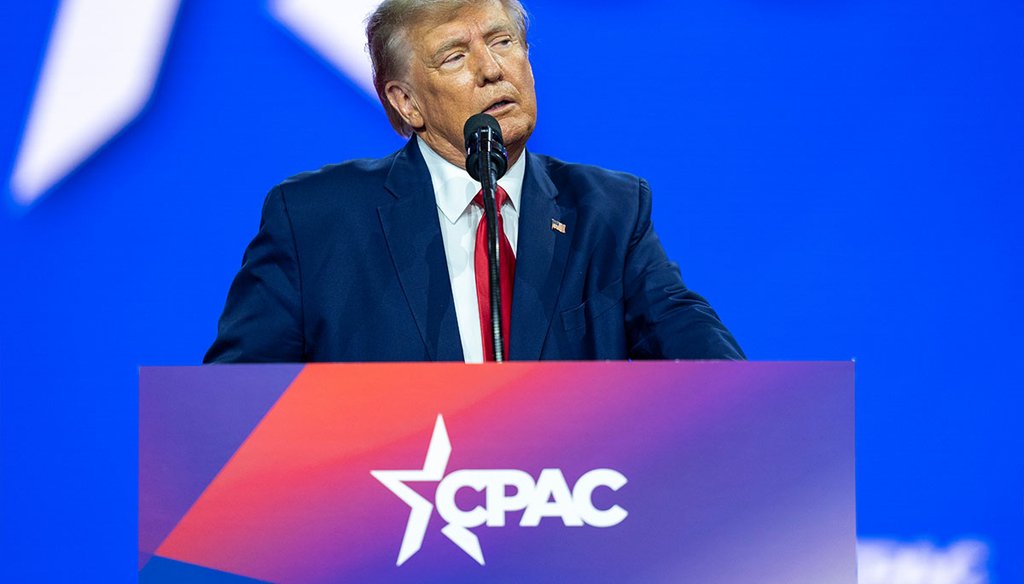Stand up for the facts!
Our only agenda is to publish the truth so you can be an informed participant in democracy.
We need your help.
I would like to contribute

Former President Donald Trump speaks March 4, 2023, at the Conservative Political Action Conference in Oxon Hill, Md. (AP)
Former President Donald Trump vowed to a Republican audience at the Conservative Political Action Conference to "finish what we started."
"I am your warrior, I am your justice — and for those who have been wronged and betrayed, I am your retribution," Trump said March 4 at the conference in National Harbor, Maryland. "I will totally obliterate the deep state."
We fact-checked several false or misleading statements he made about the 2020 election, the border, the economy and war during his more-than-90 minute speech.
Elections
"I won the second election. I won it by a lot."
Sign up for PolitiFact texts
We’ve rated this Pants on Fire! Trump lost the election to Joe Biden in 2020. Biden won with 306 electoral votes, to Trump’s 232. Biden won the popular vote by about 7 million.
Officials in Trump’s own administration were among the experts who concluded the election was secure.
"We did much better in 2020 than we did in 2016."
This is misleading and ignores the role of the Electoral College. Trump received more popular votes in 2020 (about 74 million) than 2016 (about 63 million). But the popular vote doesn’t determine the presidential victor. Trump lost the Electoral College vote in 2020, so he lost that race for president.
In Arizona during the 2022 midterm elections, "Republican areas, a tremendous percentage of the machines were broken and you couldn’t vote. … They said come back in seven hours."
Trump is wrong about Republicans being unable to vote in November. On Election Day in Maricopa County, some vote-counting machines couldn’t read some ballots because of a printing error. The equipment problems happened at about 70 of the county’s 223 vote centers. This was a significant inconvenience, and resulted in some voters waiting in long lines.
But people were not denied the right to vote. Voters who encountered a faulty tabulator were given other options, including staying and waiting for a working tabulator, voting at another voting location or putting their completed ballots in a secure slot so that officials could tabulate them later.
Technical problems at Maricopa County voting centers did not disproportionately affect Republican voters, according to a Washington Post analysis.
A court rejected a request by the Republican National Committee to extend the county’s voting hours. The court concluded there was no evidence that voters were precluded from voting. The plaintiffs voluntarily dismissed the lawsuit.
In 2022, "France had 37 million people voting, they voted in one day and at 10:30 in the evening they called the winner."
This omits context about why tabulating votes is so much faster in France than in the U.S.
When candidates run for president in the U.S., there are multiple local, state and federal races on the same ballot. The presidential contest in France in April 2022 had only one contest on the ballot.
There are other key differences in how elections operate in the two countries, including that in France nearly all voters cast their ballot on one day, in person. In the U.S., state laws generally give voters more options on how to vote, including by mail.
Border security
"I built hundreds of miles of wall and completed that task as promised."
PolitiFact tracked Trump’s promise to "build a great wall" and have Mexico pay for it and rated it a Promise Broken.
Trump mainly replaced barriers installed by previous administrations. When he entered office in 2017, the U.S. had 654 miles of primary border barriers (some sections of the border have up to three layers of barriers that run parallel to the border; the first impediment a migrant may face is the primary barrier). By January 2021, that number increased to 706 miles, according to U.S. Customs and Border Protection.
Trump replaced about 184 miles of dilapidated primary barriers with updated fences. When Trump says his administration "build hundreds of miles," what he's referring to is the replacement of older barriers with new fences, not hundreds of miles of barriers protecting the border for the first time.
"Before Biden came into office, we had illegal immigration at a record low."
This is misleading and doesn’t take into account that the coronavirus pandemic slowed down migration.
In fiscal year 2017, Border Patrol agents recorded 310,531 apprehensions nationwide, the lowest since 1971. (This included about four months of Obama’s presidency.) But apprehensions increased after that, reaching 859,501 in fiscal year 2019.
When the coronavirus began in early 2020, migration dropped, but then steadily rose after April 2020. And the way officials tracked migration data changed as the government implemented Title 42, a public health policy intended to limit the number of people coming into the U.S. This makes it hard to compare pre-pandemic immigration data to data after March 2020.
Economy
"We had the best employment numbers in history, we had the best economy in history."
We rated a similar claim False. The U.S. economy was strong before the coronavirus pandemic hit in 2020. But it was not the best in the nation’s history, economists told PolitiFact.
Before COVID-19, the unemployment rate under Trump hit historic lows. Experts said Trump could take some credit for this, but he also benefited from the continuation of trends that had been in place under former President Barack Obama.
Under Trump, growth in the nation’s gross domestic product — probably the single most important statistic used to gauge the overall strength of the economy — was similar to the rate under Obama and well below that of prior presidents.
National security
"I was the only president in decades" who "didn't have a war."
As we have reported previously, Trump did not seek congressional authorization to use military force, or formally declare war against any other country during his four-year term. He also didn’t engage the U.S. in any new protracted conflicts. However, Trump did order and oversee new military operations under existing authorizations, including counterterrorism raids that spread to several countries in the Middle East and Africa.
Formal declarations of war by Congress are rare, and have happened in just five conflicts: the War of 1812, the Mexican-American War, the Spanish-American War, World War I and World War II. Joseph DeThomas, a professor at Penn State University’s School of International Affairs, told PolitiFact that defining war solely based on formal declarations by Congress would exclude conflicts such as the Vietnam War, the Korean War and the Iraq War.
The Correlates of War Project, an academic project that collects war data, defines war as a conflict involving two organized armed forces that results in at least 1,000 battle-related casualties. Under this definition, Trump didn’t start any wars, but neither did Presidents Jimmy Carter and Gerald Ford, said Robert Gulotty, an assistant political science professor at the University of Chicago.
Says he defeated "100% of the ISIS caliphate."
This is missing key context.
Trump in October 2019 said that his administration was responsible for defeating "100%" of the ISIS caliphate. But weeks later, when he announced Islamic State leader Abu al-Baghdadi’s death, he walked that back, saying the figure was closer to 70%.
Experts told PolitiFact that ISIS had been weakened significantly, but wasn’t gone. They added that Trump largely built on President Barack Obama's long-devised strategy to fight the group.
"(ISIS) no longer has significant territorial holdings, and its top leader has been killed. It is weaker than when Trump came to office, organizationally and ideologically and territorially," Michael O'Hanlon, a foreign-policy specialist at the Brookings Institution, a Washington, D.C., think tank, previously told PolitiFact. Trump deserves some credit for that, O’Hanlon said, but "that was mostly due to the implementation of a strategy that he inherited."
Citing a journal published by the Combating Terrorism Center at West Point, The Washington Post reported in October 2020 that ISIS’ African affiliates had gained significant territory, recruits and firepower.
RELATED: Fact-checking CPAC 2023 claims about the FBI, fentanyl, IRS
RELATED: All of our fact-checks of Trump on the Truth-O-Meter
RELATED: Fact-checking 2024 presidential candidates, who’s running
Our Sources
C-SPAN, Former President Donald Trump’s speech at CPAC, March 4, 2023
See links to individual fact-checks for additional sources










































